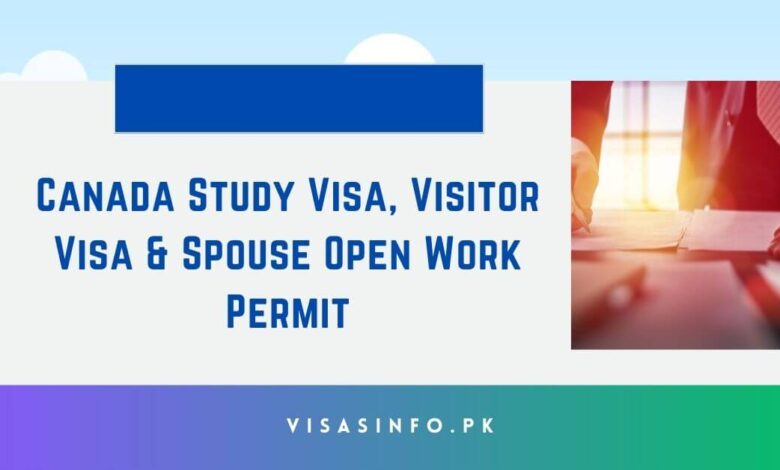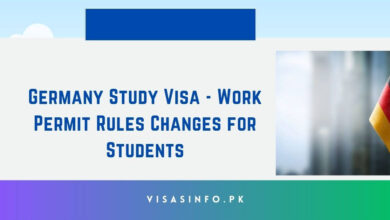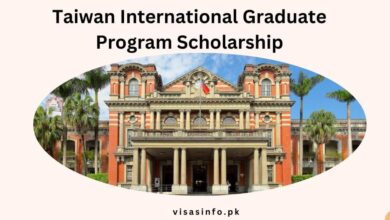Canada Study Visa, Visitor Visa & Spouse Open Work Permit

When embarking on a journey through the dynamic and ever-changing domain of Canadian immigration, one is confronted with a complex environment that is defined by trends, obstacles, and tactical concerns. This comprehensive investigation, which is predicated on the immigration minister’s statements on January 14, is intended to illuminate the potential repercussions for a variety of visa categories and construct a narrative in the context of the ever-evolving immigration landscape.
The Uncertainties Surrounding Private Colleges
Our comprehensive investigation is centered on the unpredictability of private education. There are numerous apprehensions regarding the sustainability of these institutions and the challenges that prospective pupils would encounter.
The narrative delves into the potential consequences of Post-Graduate Work Permits, generating a sense of ambiguity regarding the options available to individuals who are either enrolled in or contemplating enrollment in private institutions.
Financial Risks and Historical Closures
This investigation investigates the intricate financial risks associated with private college closures, as evidenced by historical examples. Applicants must meticulously evaluate the institutions they select to invest in and consider their options.
The immigration minister’s statements lay the groundwork for a potential paradigm shift by proposing a two-tiered system that differentiates between institutions that are trusted and those that are not.
Two-Level System
The investigation further investigates the implications of this system, specifically the impact on children who are currently enrolled or plan to enroll in schools that may not satisfy the established standards for high-quality education. The Immigration Minister’s stance is a severe indictment of private universities that use students as little more than cash cows while cutting corners on instruction, as is evident upon closer examination.
Potential Actions Against Non-Compliant Institutions
The conversation then transitions to the potential sanctions that could be imposed on organizations that are found to violate laws and regulations. A comprehensive investigation is conducted to underscore the gravity of the situation for both students and the broader private college industry.
Broadening the Perspective
The private college’s dilemma is reflected in the landscape patterns. The narrative expands its scope to encompass the visa environment, which is characterized by the necessity of employment and study permits. It is crucial to capitalize on the current favorable circumstances, as positive patterns in visa application outcomes offer prospective candidates a window of opportunity.
The investigation also examines potential modifications to post-graduate work permits, emphasizing the importance of possessing a comprehensive understanding of visa trends to make well-informed strategic decisions.
Practical Advice for Applicants
The narrative offers prospective applicants valuable advice on how to strategically select educational institutions as they navigate the intricate Visa landscape. This article analyzes the variables that applicants should consider when planning their educational and immigration pathways, focusing on the potential impact of visa trends on work permits and study permits.
Real-Life Case Studies and Ethical Practices
A comprehensive set of navigational strategies is offered for both work and study visas, allowing applicants to make well-informed decisions as they navigate the constantly evolving Canadian immigration landscape. To illuminate the complexities of the visa application process, real-world case studies are presented.
These narratives serve as illustrative case studies of individuals who successfully obtained visas on their initial attempts, despite multiple denials. The immigration consulting industry’s commitment to ethical business practices is underscored by the emphasis on genuine profiles and transparent guidance.
Industry Risk Mitigation Strategies
The narrative emphasizes the importance of undertaking due diligence before selecting educational institutions to empower applicants and provide risk mitigation measures. It is advisable to prioritize public colleges, and guidance is provided on how to transfer institutions without exceeding the budget. The objective is to equip candidates with the knowledge required to make informed decisions and avoid potential pitfalls as they pursue Canadian visas.
Check Also: 7 New Australia Student Visa Rules
Evolving Dynamics of Diploma Programs
The prospect of pursuing higher education in Canada has long been alluring to international students. However, uncertainty and complexity are introduced by the recent modifications to Canada’s immigration system, particularly about student visas.
This comprehensive investigation aims to offer a comprehensive understanding of current changes by shedding light on the evolving dynamics of diploma programs and the concerns surrounding private colleges, in addition to providing prospective students with strategic insights. Canadian education has undergone a significant paradigm shift.
Benefits of Canada Study Visa, Visitor Visa & Spouse Open Work Permit
- World-Class Education: Enables students to enroll in Canada’s globally recognized educational institutions, which are renowned for their diverse programs and high standards.
- Working While Studying: Students are permitted to work part-time (up to 20 hours per week) during academic sessions and full-time during scheduled vacations. This arrangement enables them to acquire valuable work experience and earn money to support their stay.
- Pathway to Permanent Residency: The completion of a Canadian educational program can be a significant step toward permanent residency (PR). The Post-Graduation Work Permit (PGWP) is a program that enables students to work in Canada after graduation. This can result in the eligibility for permanent residency through Express Entry or other immigration pathways.
- Dependents can accompany students: by applying for an open work permit, which grants them the right to work in Canada for the duration of the student’s study permit. This permit is available to spouses or common-law partners of students. Additionally, dependent children are eligible to enroll and pursue their education in Canada.
- Healthcare Accessibility: Certain provinces provide international students with healthcare coverage, guaranteeing that they have access to medical services during their stay.
- Cultural Exposure: The opportunity to study in Canada provides the opportunity to immerse oneself in a multicultural society, which fosters personal and professional development by providing a variety of viewpoints.
The Structure of Diploma Programs
Numerous institutions have implemented an expedited approach that shortens the curriculum from its conventional two-year duration to one year. The reasons for this transformation are deconstructed in this section, which examines the effects on students and the differences between different universities.
Impact Accelerated Programs
It is imperative to understand the impact of accelerated programs on specific areas, such as the rapid conclusion of diplomas and post-graduate job licenses. The discussion encompasses the potential hazards and advantages of completing a two-year diploma in a single year, as well as the repercussions for students in this fast-paced learning environment.
Perspective is also provided by the explanation of procedures, such as the timing of the announcement of results and the process for submitting a passport thereafter.
Students Challenges and Opportunities
Despite the allure of accelerated programs, this section objectively evaluates the opportunities and obstacles. The current concerns regarding the depth of education within a limited period and potential long-term implications on Career trajectories are discussed to provide students with a more nuanced understanding of their educational courses.
Private Colleges Under Scrutiny
Private colleges are experiencing increased scrutiny amid the evolving academic environment. In light of recent comments made by the minister of immigration and previous instances of college closures, there are concerns about the sustainability and dependability of private colleges. This section emphasizes the importance of students making informed and deliberate decisions regarding private universities, as it addresses the ambiguity that surrounds them.
Two-Level System and Implication
The Immigration Minister’s recent statements regarding a two-tier system for distinguishing between trustworthy and untrustworthy institutions have been a significant subject of discussion. The effects of this proposed system on the broader private college market are analyzed, and students’ coping mechanisms are discussed.
Students can make well-informed decisions that balance their objectives with the regulatory environment by critically scrutinizing past examples of private college closures, which can provide them with insight into potential financial risks.
Balancing Perspectives on Private Colleges
Private colleges provide value to the educational system, despite the uncertainty. This section endeavors to present a fair perspective while acknowledging the beneficial contributions of private institutions. The story underscores the importance of striking a balance between the advantages that private colleges provide and the necessity for students to mitigate the risks associated with these institutions. It also encourages students to make decisions with an awareness of potential hazards.
Strategic Decision-Making in the Broader Visa Landscape
This section provides a comprehensive examination of the current trends and positive trajectories in Visa results, thereby redirecting the attention to the broader Visa environment.
Understanding Current Trends in Visa Results
Prospective applicants must be cognizant of the current trends in visa approvals. The discussion delves into statistical data, accentuating successful trajectories and offering insights into the factors that contribute to successful visa outcomes.
Navigational Strategies for Study and Work Permits
We examine navigational strategies for work and study permits. The presentation provides real-world case studies that effectively illustrate Visa Journeys and underscore the importance of explicit instruction. Prospective students are provided with a comprehensive array of resources to assist them in making well-informed decisions, thereby allowing them to identify universities that will assist them in achieving their goals and enhancing the status of their visa applications.
Risk Mitigation Strategies
At the forefront of visa applications are strategies for risk mitigation. In this section, the emphasis is on the provision of a successful and seamless visa application process. Applicants are encouraged to prioritize due diligence when selecting educational institutions.
As a result, by providing applicants with the necessary information and coping mechanisms to navigate the changing requirements for Canadian student visas, the probability of a favorable outcome is increased and doubts are diminished.
Empowering Prospective Students
Prospective students are encouraged to actively engage in the evolving Canadian immigration system by acquiring comprehensive knowledge and strategic insights. The speech functions as a manual, emphasizing the importance of moral discernment, flexibility, and alertness.
The encouragement to applicants to approach their educational journey with confidence and foresight to guarantee a successful and transformative experience in the rich environment of Canadian academia is a call to action that resonates well with those who are pursuing Canadian visas.
Frequently Asked Questions:
-
Can we convert a visitor visa into a spouse’s open work permit in Canada?
Visitor Visa to Work Permit (without LMIA)
You can obtain an open work permit without requiring an LMIA. If your spouse or common-law partner has a study permit and is studying in a DLI, you can apply for an open work permit as a temporary visitor. -
Can I get a work permit if my spouse is studying in Canada?
If you are an international student studying full-time and have a valid study permit, your spouse or common-law partner can apply for an open work permit. Your spouse/partner will not require a job offer to apply, and his/her permit will be valid for the same period as your study permit. When should you apply?
-
Can I get an open work permit on a visitor visa in Canada?
Can I apply for a work permit as a visitor in Canada? Yes, individuals with a valid visitor visa or those in Canada on implied status may apply for a work permit if they have a job offer from a Canadian employer.



